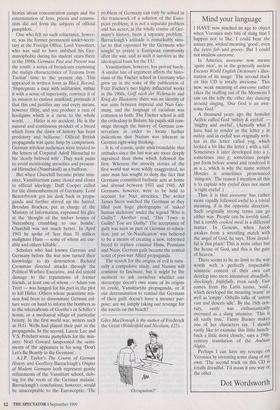Mind your language
I HAVE now reached an age to object when Veronica uses bits of slang that I happen not to like. I could bear the unisex guy, wicked meaning 'good', even the retro fab and groovy. But I could not swallow awesome.
In America, awesome now means `quite nice', as in the generally useless Encarta World English Dictionary's illus- tration of its usage: 'The second track on this CD is totally awesome.' This new, weak meaning of awesome rather takes the stuffing out of the Mormons I saw on the telly the other day dancing around singing, 'Our God is an awe- some God.'
A thousand years ago the homilist Aelfric called God `mihtiy & eyefull' 'mighty and aweful'. (Actually what I have had to render as the letter yin mihtiy and in eyefull was originally writ- ten as the letter called yog, which looked a bit like the letter z with a tail. Sometimes it later developed into a y, sometimes into g; sometimes people put form before sound and rendered it as a z, which is why the name written Menzies is sometimes pronounced `ming-ies'. The reason I mention all this is to explain why eyefull does not mean `a right eyeful'.)
Thus it is that awesome has rather more rapidly followed awful to a trivial meaning, if in the opposite direction. Such originally strong terms can go either way. People can be terribly kind; but a terribly cooked meal is a different matter. In Genesis, when Jacob awakes from a wrestling match with the angel of God, he says, 'How dread- ful is this place! This is none other but the house of God, and this is the gate of heaven.'
There seems to be no limit to the way words with a perfectly respectable semantic content of their own can develop into mere intensives: dreadfully, shockingly, frightfully, even vastly. Vast comes from the Latin vastus, 'void', which developed the meaning 'waste' as well as 'empty'. Othello talks of 'antres vast and deserts idle'. By the 18th cen- tury, vastly was enthusiastically overused as a slang intensive: 'This is all vastly true,' Fanny Burney makes one of her characters say. 'I should vastly like to examine this little hunch- back a little more closely,' says a 19th- century translation of the Arabian Nights.
Perhaps I can have my revenge on Veronica by inventing some slang of my own: 'The second track on this CD is totally dreadful.' I'd mean it one way or the other.
Dot Wordsworth


























































 Previous page
Previous page